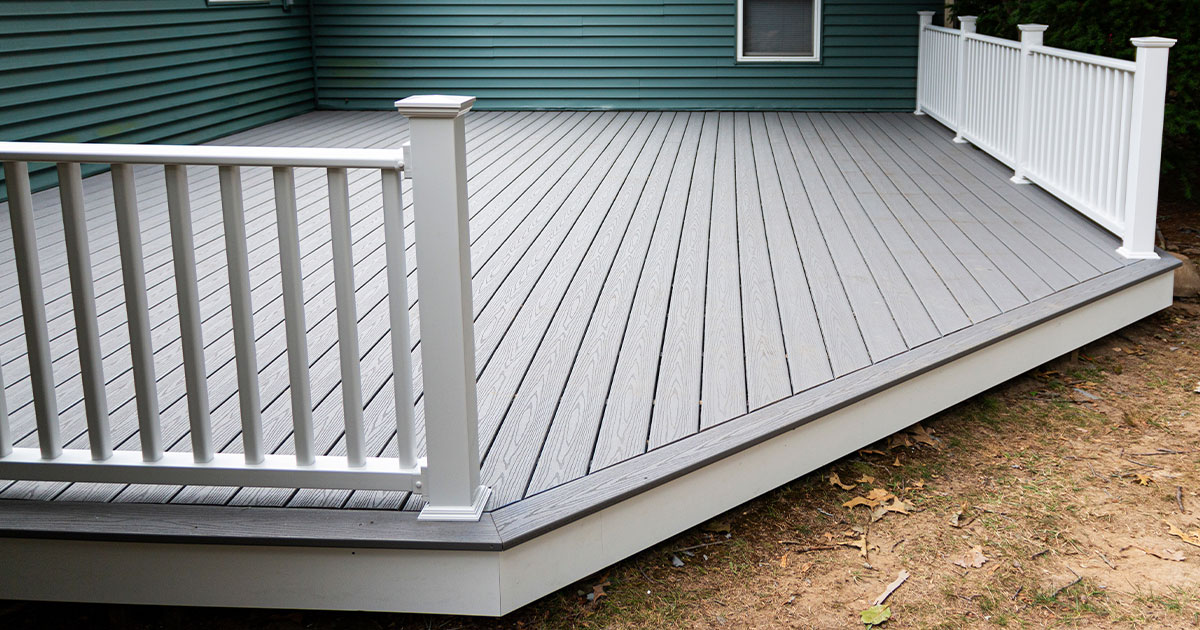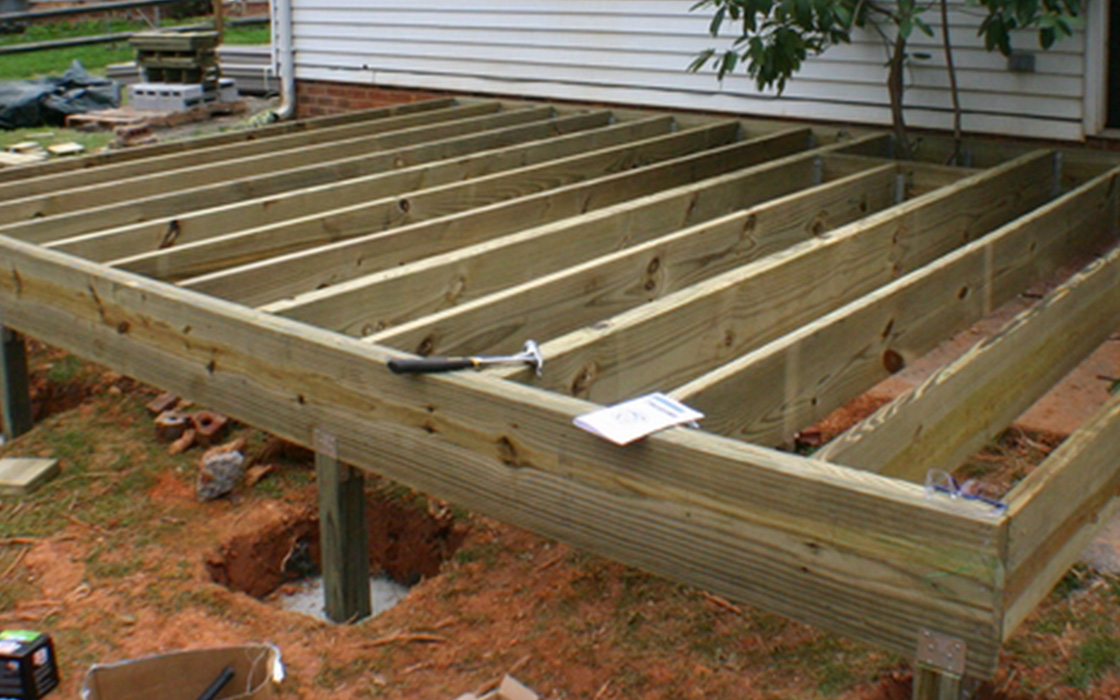A successful deck installation starts with careful planning and a trustworthy crew.
A successful deck installation starts with careful planning and a trustworthy crew.
Blog Article
How to Pick the Right Products for Your Deck Setup Job
Selecting the suitable materials for your deck installment task can appear difficult. There are numerous factors to take into consideration, from resilience and upkeep to visual appeals and ecological impact. The selection in between traditional timber and composite materials, each with its very own collection of advantages and drawbacks, can be particularly difficult. The key is to balance your budget plan, layout preferences, and way of life requires to develop a deck that will improve your outdoor room for many years to come.
Comprehending the Different Kinds Of Deck Materials
When beginning on a deck installment project, the choice of products ends up being a crucial choice. Composite materials, on the various other hand, are a mix of timber and plastic, giving durability and resistance to weather aspects. By comprehending these distinctions, home owners can make a much more enlightened choice on the most ideal deck product for their particular needs.
Assessing the Longevity and Upkeep Needs of Deck Products
Analyzing the sturdiness and maintenance needs of deck materials is a crucial action in deck installation. Longevity involves the material's ability to endure harsh climate condition, damage, and its long life. For circumstances, cedar and redwood are naturally immune to rot and insects, making them durable choices. On the other hand, pressure-treated timber, while sturdy, might call for even more maintenance as a result of its sensitivity to splitting and deforming.
Comprehending upkeep requirements is equally essential. Some products require regular sealing or staining to keep their look and resist moisture damages, while others, like composite outdoor decking, demand less maintenance. By examining these aspects, one can pick the most appropriate decking material, guaranteeing an equilibrium between sturdiness, maintenance demands, and aesthetic allure.
Price Evaluation: Contrasting Wood and Compound Decking
Although price may initially appear like a secondary problem, it is a considerable factor when contrasting wood and composite outdoor decking. On the other hand, composite outdoor decking, while costlier originally, needs much less maintenance, possibly decreasing long-lasting costs. Prospective deck proprietors need to consider their budget plan and willingness to keep their decks when making a decision between wood and composite decking.
Looks and Design Flexibility of Decking Products
All-natural timber outdoor decking provides a timeless, timeless look, while composite products use a vast variety of shades and structures to match diverse tastes and styles. Compound products, while much less versatile in style, are still versatile enough for a lot of deck styles. These elements, for that reason, are critical determinants in the option of outdoor decking material.
Ecological Effect of Decking Materials
When selecting outdoor decking materials, one need to take into consideration not just appearances and toughness, yet likewise the ecological impact. It's essential to examine the sustainability of materials and discover recycled decking choices. Additionally, comprehending the potential influence on regional communities will ensure an extra environmentally liable choice.
Analyzing Material Sustainability
In the world of deck construction, analyzing product sustainability is an important step. Composite decking products frequently integrate timber and plastic, lowering the need for new timber however raising dependence on fossil gas - deck installation. Hence, the choice of decking products must stabilize performance, visual appeals, cost, and sustainability to make certain a liable and long-lasting installation.
Recycled Outdoor Decking Choices

Compound outdoor decking is especially preferred because of its sturdiness and ease of upkeep. It's resistant to rot, insects, and fading, making it a durable alternative. Recycled plastic decking, on the other hand, is highly resistant and calls for very little maintenance. While these materials might lug a greater first price, their long life and decreased ecological influence make them a sensible investment for the eco-conscious homeowner.

Influence On Local Environments
While the advantages of using recycled products for outdoor decking can not be overstated, it's equally crucial to consider the wider ecological effects of these selections. The extraction, processing, and transportation of materials can exceptionally affect local communities. Deforestation for timber outdoor decking adds to environment loss and climate modification. Also the manufacturing of composite products can release hazardous emissions. Conversely, using recycled or sustainably sourced products can aid mitigate these results. Taking into consideration the life expectancy of materials can lower ecological impact; longer-lasting options call for much less regular substitute, therefore preserving resources. Appropriate disposal of old outdoor decking is essential to lessening landfill waste. Basically, an eco-conscious deck project needs mindful material option, sustainable sourcing, and liable disposal.
Making Your Last Choice: Tips for Picking the most effective Deck Materials
As the post changes into the subtopic of "Making Your Last Choice: Tips for Selecting the most effective Deck Products", it is crucial to comprehend the range of deck products offered. Striking an equilibrium in between resilience and appearance is essential in this selection process. The complying with discussion will certainly direct viewers in making an educated choice based on these key factors to consider.
Recognizing Various Deck Products
The job of picking the appropriate materials blog for your deck setup can seem discouraging as a result of the huge selection of options available. Nevertheless, comprehending the different products can streamline this process. Wood is a popular selection, offering a classic visual and cost. Kinds of wood utilized include pressure-treated lumber, cedar, and redwood. Compound materials, made from a blend of timber and plastic, are low-maintenance and immune to rot and insects. Plastic or PVC decks are a lot more resilient and need less upkeep than composite products, but they can look less natural. Aluminum decks are strong, lightweight, and immune to rot, but they are additionally learn this here now the most expensive alternative. Each product has its own benefits and downsides, making it crucial to consider your specific requirements prior to making a final choice.
Sturdiness vs. Looks Equilibrium
Balancing resilience with aesthetic appeals can be a challenge when choosing deck products. The decision often comes down to individual preferences and the deck's meant usage. High-traffic locations may require durable products like composite outdoor decking, which withstands damage but may lack the natural appeal of timber. On the other hand, timber uses a classic appeal and heat that artificial materials struggle to replicate. Nevertheless, it needs much more maintenance and may not last as long. Therefore, house owners require to strike a balance, taking into consideration both the deck's functional demands and their aesthetic choices. By doing so, they can ensure their deck continues to be a practical and eye-catching exterior area for years to come.
Final thought
In verdict, picking the right products for your deck setup project requires cautious factor to consider of factors such as resilience, upkeep, price, visual appeals, and ecological influence. Whether you select traditional timber or composite materials, your selection needs to straighten with your budget plan, layout preferences, and way of life. Inevitably, the most effective outdoor decking product is one that improves your exterior room and offers enjoyment for years ahead.
Report this page